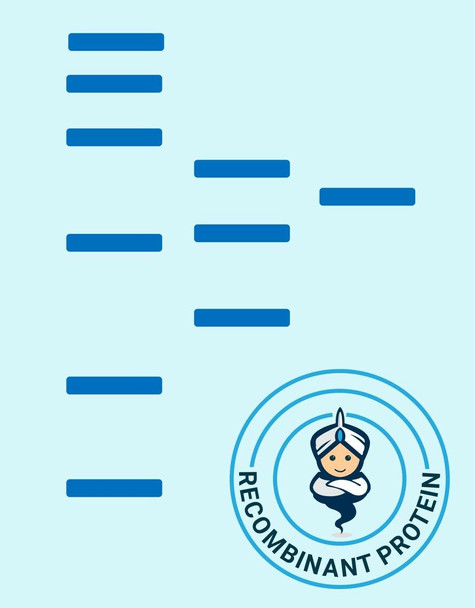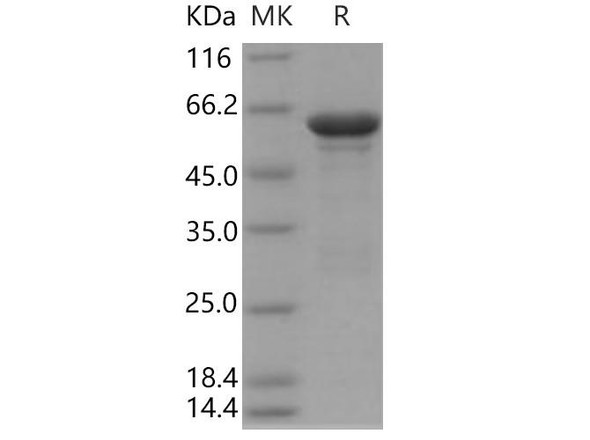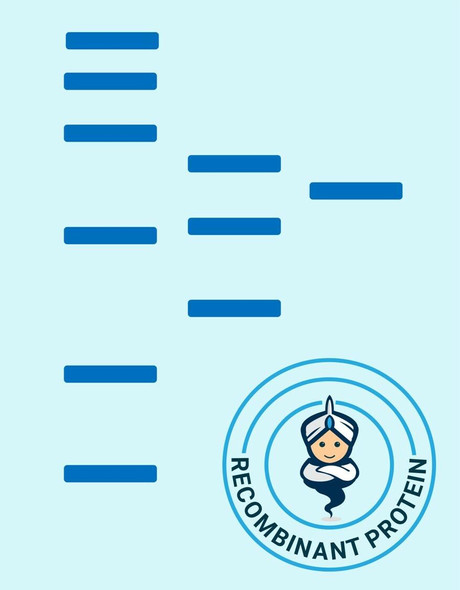Enzymes Recombinant Proteins
Human ALDOB Recombinant Protein (RPPB1392)
- SKU:
- RPPB1392
- Product Type:
- Recombinant Protein
- Species:
- Human
- Uniprot:
- P05062
- Research Area:
- Enzymes
Description
| Product Name: | Human ALDOB Recombinant Protein |
| Product Code: | RPPB1392 |
| Size: | 20µg |
| Species: | Human |
| Target: | ALDOB |
| Synonyms: | Fructose-bisphosphate aldolase B, Liver-type aldolase, ALDOB, ALDB, Aldolase B fructose-bisphosphate, ALDO2, aldolase 2, Aldolase B fructose-bisphosphatase. |
| Source: | Escherichia Coli |
| Physical Appearance: | Sterile Filtered clear colorless solution. |
| Formulation: | The ALDOB solution (1mg/ml) contains 20mM Tris-HCl buffer (pH 8.0), 1mM DTT, 10% glycerol and 0.1M NaCl. |
| Stability: | Store at 4°C if entire vial will be used within 2-4 weeks. Store, frozen at -20°C for longer periods of time. For long term storage it is recommended to add a carrier protein (0.1% HSA or BSA).Avoid multiple freeze-thaw cycles. |
| Purity: | Greater than 95.0% as determined by SDS-PAGE. |
| Amino Acid Sequence: | MGSSHHHHHH SSGLVPRGSH MGSHMAHRFP ALTQEQKKEL SEIAQSIVAN GKGILAADES VGTMGNRLQR IKVENTEENR RQFREILFSV DSSINQSIGG VILFHETLYQ KDSQGKLFRN ILKEKGIVVG IKLDQGGAPL AGTNKETTIQ GLDGLSERCA QYKKDGVDFG KWRAVLRIAD QCPSSLAIQE NANALARYAS ICQQNGLVPI VEPEVIPDGD HDLEHCQYVT EKVLAAVYKA LNDHHVYLEG TLLKPNMVTA GHACTKKYTP EQVAMATVTA LHRTVPAAVP GICFLSGGMS EEDATLNLNA INLCPLPKPW KLSFSYGRAL QASALAAWGG KAANKEATQE AFMKRAMANC QAAKGQYVHT GSSGAASTQS LFTACYTY |
ALDOB is a tetrameric glycolytic enzyme which catalyzes the reversible cleavage of fructose 1-phosphate into dihydroxyacetone phosphate and glyceraldehyde. Fructose-bisphosphate aldolase B (ALDOB) is one of 3 known aldolase isoenzymes, and is located in the kidney and the small adult intestine where it is linked with aldolases A or C. ALDOB is regulated by Insulin and glucagon and is implicated in hereditary fructose intolerance disease.
ALDOB Human Recombinant produced in E.coli is a single, non-glycosylated polypeptide chain containing 388 amino acids (1-364) and having a molecular mass of 42kDa.ALDOB is fused to a 24 amino acid His-tag at N-terminus & purified by proprietary chromatographic techniques.
| UniProt Protein Function: | ALDOB: Defects in ALDOB are the cause of hereditary fructose intolerance (HFI). HFI is an autosomal recessive disease that results in an inability to metabolize fructose and related sugars. Complete exclusion of fructose results in dramatic recovery; however, if not treated properly, HFI subjects suffer episodes of hypoglycemia, general ill condition, and risk of death the remainder of life. Belongs to the class I fructose-bisphosphate aldolase family. |
| UniProt Protein Details: | Protein type:Carbohydrate Metabolism - fructose and mannose; Carbohydrate Metabolism - glycolysis and gluconeogenesis; Carbohydrate Metabolism - pentose phosphate pathway; EC 4.1.2.13; Lyase Chromosomal Location of Human Ortholog: 9q21.3-q22.2 Cellular Component: microtubule organizing center; cytosol Molecular Function:identical protein binding; protein binding; cytoskeletal protein binding; fructose-bisphosphate aldolase activity; ATPase binding Biological Process: fructose 1,6-bisphosphate metabolic process; NADH oxidation; glycolysis; positive regulation of ATPase activity; carbohydrate metabolic process; glucose metabolic process; pathogenesis; fructose catabolic process; gluconeogenesis; fructose metabolic process Disease: Fructose Intolerance, Hereditary |
| NCBI Summary: | Fructose-1,6-bisphosphate aldolase (EC 4.1.2.13) is a tetrameric glycolytic enzyme that catalyzes the reversible conversion of fructose-1,6-bisphosphate to glyceraldehyde 3-phosphate and dihydroxyacetone phosphate. Vertebrates have 3 aldolase isozymes which are distinguished by their electrophoretic and catalytic properties. Differences indicate that aldolases A, B, and C are distinct proteins, the products of a family of related 'housekeeping' genes exhibiting developmentally regulated expression of the different isozymes. The developing embryo produces aldolase A, which is produced in even greater amounts in adult muscle where it can be as much as 5% of total cellular protein. In adult liver, kidney and intestine, aldolase A expression is repressed and aldolase B is produced. In brain and other nervous tissue, aldolase A and C are expressed about equally. There is a high degree of homology between aldolase A and C. Defects in ALDOB cause hereditary fructose intolerance. [provided by RefSeq, Dec 2008] |
| UniProt Code: | P05062 |
| NCBI GenInfo Identifier: | 113611 |
| NCBI Gene ID: | 229 |
| NCBI Accession: | P05062.2 |
| UniProt Secondary Accession: | P05062,Q13741, Q13742, Q5T7D6, |
| UniProt Related Accession: | P05062 |
| Molecular Weight: | Calculated MW: 39kDaObserved MW: 39kDa |
| NCBI Full Name: | Fructose-bisphosphate aldolase B |
| NCBI Synonym Full Names: | aldolase B, fructose-bisphosphate |
| NCBI Official Symbol: | ALDOB�� |
| NCBI Official Synonym Symbols: | ALDB; ALDO2�� |
| NCBI Protein Information: | fructose-bisphosphate aldolase B; aldolase 2; liver-type aldolase; aldolase B, fructose-bisphosphatase |
| UniProt Protein Name: | Fructose-bisphosphate aldolase B |
| UniProt Synonym Protein Names: | Liver-type aldolase |
| Protein Family: | Fructose-bisphosphate aldolase |
| UniProt Gene Name: | ALDOB�� |
| UniProt Entry Name: | ALDOB_HUMAN |






